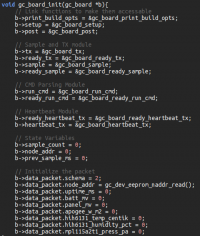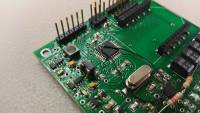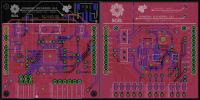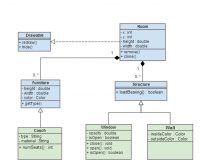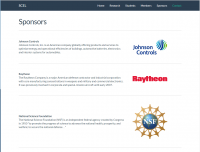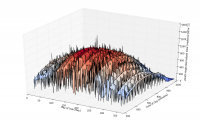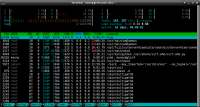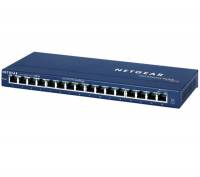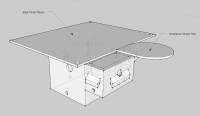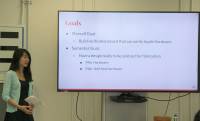SCEL Learning Topics
Projects in the Smart Campus Energy Lab encompass a variety of topics and provide students with a unique opportunity to learn new skills in a collaborative environment.
A quick note to students: there is no single project for a single topic because most projects are cross-topic, meaning they're a combination of many skills and fields.
Programming
Computer programming, or programming, is a process that leads from an original formulation of a computing problem to executable computer programs.
Students have the opportunity to practice the programming skills that they've learned in their courses. They also have the opportunity to learn other languages that are not a part of the curriculum. Competency in programming is a valuable trait that Electrical Engineering and Computer Engineering companies will look for when hiring.
Programming languages that are used in the lab include:
- Python
- Ruby
- C
- C++
- Javascript
- HTML
- CSS
- SQL
- Bash
Projects:
- Gateway Software for Weatherbox Project - Python, HTML, CSS, SQL, bash
- Unified Firmware for Weatherbox Project - C, C++
- Wind Sensor - C, C++
- Forecasting - Python with NumPy, Matplotlib
Embedded Systems
An embedded system is a computer system with a dedicated function within a larger mechanical or electrical system, often with real-time computing constraints. It is embedded as part of a complete device often including hardware and mechanical parts.
Topics in embedded systems. IoT, board bring-up, verification, validation, DFT, etc.
- Arduino Platform
- Atmel 8-bit and 32-bit microcontrollers
- Raspberry Pi
- Teensy 3.1
- I2C
- SPI
- Ethernet/Wifi
- XBee 2.4Ghz Transceivers
Projects
- Weatherbox Project
- Wind Sensor
PCB Design, Layout and Fabrication
Designing the boards, routing. Physical skills such as soldering, re-work, reflow, etc. DFT, etc.
Use Eagle software to design PCBs. Mostly surface mount components, etc. Practice with a Bill of Materials.
- Apple Design
- Cranberry Design
- Dragonfruit Design
- Wind Sensor
Software Engineering
Software engineering is the application of engineering to the design, development, implementation, testing and maintenance of software in a systematic method. Since much of the software in the lab has to be reliable, testable and easily maintained, students have a unique opportunity to work on software engineering practices such as:
- Version Control
- Continious Integration
- Unit Testing
- Design For Test (DFT) principles
- Distributed Systems
- Simulation/Emulation
- Virtual Machines
- Kernel Containerization
- Code Reviews
Web Development and Design
Web development is a broad term for the work involved in developing a web site for the Internet (World Wide Web) or an intranet (a private network). Web development can range from developing the simplest static single page of plain text to the most complex web-based internet applications, electronic businesses, and social network services.
Frameworks and languages such as Ruby on Rails, HTML, CSS and Javascript to create interactive websites.
Students have the opportunity to work on the SCEL website as well as web applications that allow the lab to keep track of inventory, sensors and other things. Web development is a great side skill to have.
- Ruby on Rails
- Node.js
- PHP
- Nginx Web Server
Systems Engineering
Systems engineering is an interdisciplinary field of engineering that focuses on how to design and manage complex engineering systems over their life cycles. At its core systems engineering utilizes systems thinking principles to organize this body knowledge.
By splitting some projects into sub-systems, students are able to get exposure to some systems engineering concepts. Systems engineering is an interdisciplinary field of engineering that focuses on how to design and manage complex engineering systems over their life cycles.
- Gantt Charts
- PDR, CDR
- Power Budgets
Signal Processing
Signal processing is an enabling technology that encompasses the fundamental theory, applications, algorithms, and implementations of processing or transferring information contained in many different physical, symbolic, or abstract formats broadly designated as signals.
Skills:
- Machine Learning
- Numpy
- Python
- Jupyter Notebook
- Linearization
- Least Squares
- Fast Fourier Transform
Projects
- Forecasting
- Wind Sensor
Linux Operating Systems
Linux is a free and open source operating system that is used in production systems and servers all over the world.
Most of the computers in the lab have linux installed. Students can learn to use linux-based operating systems that many employers also use. The lab also has direct access to two servers where students can learn how to manage and upkeep a real production system.
Linux Distributions:
- Debian
- Ubuntu
- RHEL 6
- CentOS 7
Information Technology
Although none of the current projects in SCEL have a focus on information technology, there are many side tasks that students can get involved with to learn more IT-related skills.
- Routers / Network configuration
- Port forwarding, network security
- Server maintenance
- Troubleshooting
Projects:
- Wiki
- Web Hosting
- Server Upkeep
- Lab Workstation Upkeep
- Lab Networking Equipment
3D Printing
3D printing, also known as additive manufacturing (AM), refers to processes used to synthesize a three-dimensional object in which successive layers of material are formed under computer control to create an object. The lab has 2 makerbot 3d printers which students can use for various projects to rapidly prototype enclosures and housings for electronics projects.
Projects:
- Wind Sensor
- Weatherbox design teams
Presentations
All students in the lab who are taking projects for a credit are required to present a PDR, CDR and final presentation every semester. Students get an opportunity to practice their oral communication skills and present to other students as well as faculty and technical mentors.
- Proposal Presentation
- Preliminary Design Review
- Critical Design Review
- Final Presentation
Communication and Teamwork
Students gain valuable communication and teamwork skills. Email is used by teams internally, as well as to communicate with other teams. Therefore, students have a chance to practice email and physical communication in a low risk environment.
- Weekly meetings
- Mentorship
- Meeting minutes
Leadership and Mentorship
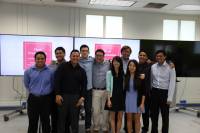 As a part of the Vertically Integrated Projects Program pioneered by Georgia Tech, our lab encourages the development of leadership and mentorship skills. Students are encouraged and put in positions of mentor-ship to help new students with technical content. This fosters the development of leadership skills that also can be very valuable in industry.
As a part of the Vertically Integrated Projects Program pioneered by Georgia Tech, our lab encourages the development of leadership and mentorship skills. Students are encouraged and put in positions of mentor-ship to help new students with technical content. This fosters the development of leadership skills that also can be very valuable in industry.
Authors
Contributing authors:
Created by kluong on 2016/11/04 23:04.
